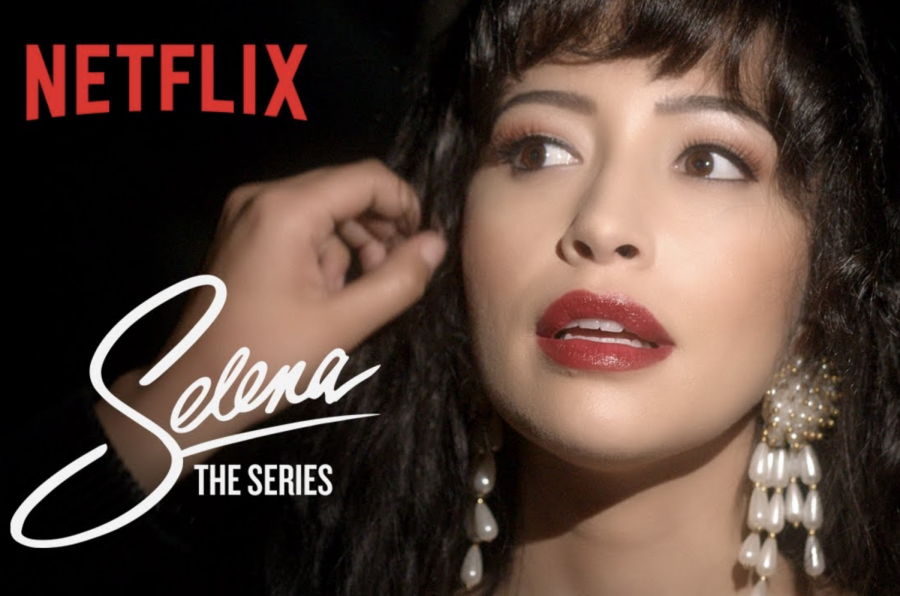While softening the struggle, ‘Selena’ tells generation-spanning story
February 3, 2021
The Netflix original series “Selena” follows the story of Selena Quintanilla, a 1990s pop singer considered one of the most influential Mexican American entertainers from the 20th century and who was killed at the height of her career in 1995 at age 23. The cultural significance of Selena and her story make “Selena” a positive step toward Mexican American representation and appreciation, yet the show presents an optimistic story that doesn’t fully describe the struggles the real Selena faced, according to members of the Latinos Unidos.
Club members held a group watch party for the first few episodes of the show to celebrate Selena’s cultural significance.
“We started watching ‘Selena’ as a group, and now we’re all finishing the show on our own,” senior Veronica Godina, Latinos Unidos president, said. “Still, we talk together about what we like about it, all the outfits and the songs. It’s just been such a great thing to share with my friends.”
Veronica has been watching the rest of the show with her family. Veronica’s parents, who remember following Selena’s rise to fame in the ’90s, have been intense in their attention to the show. They watched documentaries about Selena’s life in preparation for the show’s release and had finished the entire season two days after it was released. Veronica says that sometimes she heard them listening in their room.
The Netflix show is also introducing Selena to a new generation. Older generations saw the rise of Selena and lived through her story. Many younger people also grew up with the Selena movie. Now, the show is reintroducing her story.
“I finished watching with my little sister, it’s cool to show her the story that I grew up with. When I was younger, I had the movie and now my sister will have the show.”
To this day, Selena remains a cultural icon spanning generations, especially within the Mexican American community.
“She was my idol growing up. Every little Mexican American girl loves her. She’s like our Lady Gaga or Beyoncé,” said Sari Hernandez, an English teacher who advises the Latinos Unidos.
Even though Selena died in 1995, Veronica shares the same sentiment as Ms. Hernandez.
“Everyone knows Selena,” Veronica said. “Her songs play at every party or even in the background while cooking. She’s an icon.”
The Netflix show’s first season follows the uplifting story of Selena’s rise to stardom. However, the happy tone will certainly change next season, which is already greenlit, as Selena’s true story ends with her murder by her friend and manager of her boutiques. Concerns about how the show will handle this dark subject have caused controversy, as some critics question whether a PG show can portray the gravity of Selena’s death.
“The show does feel almost sanitized,” Ms. Hernandez said. “It’s presenting this sort of fairy tale life where everyone knows things will work out, but that’s not always an accurate representation of struggle.”
Despite the show’s issues, “Selena” is a positive step toward Mexican American representation. Ms. Hernandez said it’s important to have Mexican American characters and actors, but she added that representation means depicting the specific struggles of minority groups.
She would like to see more minority characters presented on screen with depth, rather than simply using stereotypes for humor. Ms. Hernandez feels that “Selena” successfully worked to depict the characters as real people, even though she feels their struggles as Mexican Americans were underplayed.
Ms. Hernandez recommends students watch the 2020 show “Party of Five” or the original 1997 “Selena” movie in order to educate themselves through positive media. Despite a few exceptions, such as the options given by Ms. Hernandez, Mexican Americans are underrepresented in mainstream media in proportion to the Mexican American population.
“It means the world for kids growing up to see someone they relate to in movies or shows,” Ms. Hernandez said. “I’m watching the whole show because I want to tell Netflix that I’m glad they’re working on representation.”




























































